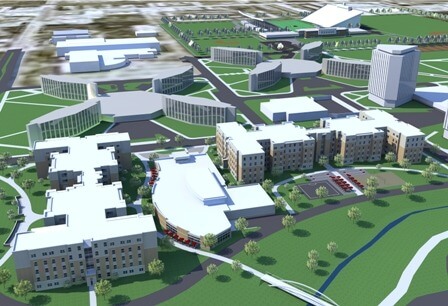Northern Illinois University announced plans to implement a second-year residency requirement beginning with the Fall 2015 entering class.
Plans were unveiled during a presentation at the May 10 Board of Trustees meeting.
Student academic success and matriculation are key to the university’s Vision 2020 goals, and factors impacting sophomore success have been shown to directly impact retention rates. Analysis of NIU data shows students who choose to live in NIU residence halls are retained in greater numbers than those who choose to live off-campus.
“This second-year residential policy, along with the substantial improvements being made in terms of student residence life, will strengthen NIU’s distinctive learning environment for years to come,” says NIU President John G. Peters. “Our Vision 2020 Initiative is ambitious, and engaged learning as relates to student success and matriculation is a key component of this vision.”
The “residential renaissance” under way at NIU includes renovation of Grant Towers (2011-2013) and Gilbert Hall (2013) in addition to construction of a new, $82 million residence hall and a recreational sports complex. The spacious rooms with modern amenities allow for privacy and security while delivering the features today’s students demand.
Second-year residential policies are common among NIU’s peer institutions in the state and across the Mid-American Conference, including Illinois State University, Western Illinois University, Southern Illinois University-Edwardsville, Bowling Green State University, Kent State University, Miami University and Ohio University. Analysis shows most of the comparable institutions within the MAC and the state with a second-year residential living requirement have higher retention rates.
Ray Alden, executive vice president and provost, sees the opportunity to provide a more comprehensive learning environment.
“Second-year residency provides students additional experiences that are an essential part of a well-rounded university experience,” he says. “Learning communities allow students to engage with each other and with faculty, sparking meaningful interactions and the opportunity to apply knowledge learned in the classroom.”
In addition to enhancing academic success, second-year residency offers security benefits and other options for second-year programming to improve students’ social interaction and engagement, leading to greater matriculation.
“Academic literature supports the conclusion that students who live on campus are more likely to persist and graduate than those who commute,” says Brian O. Hemphill, vice president of student affairs and enrollment management. “Second-year residency offers students another opportunity to be a part of an NIU Living Learning Community. It can enhance student life through programming and provide a heightened sense of belonging and involvement.”

